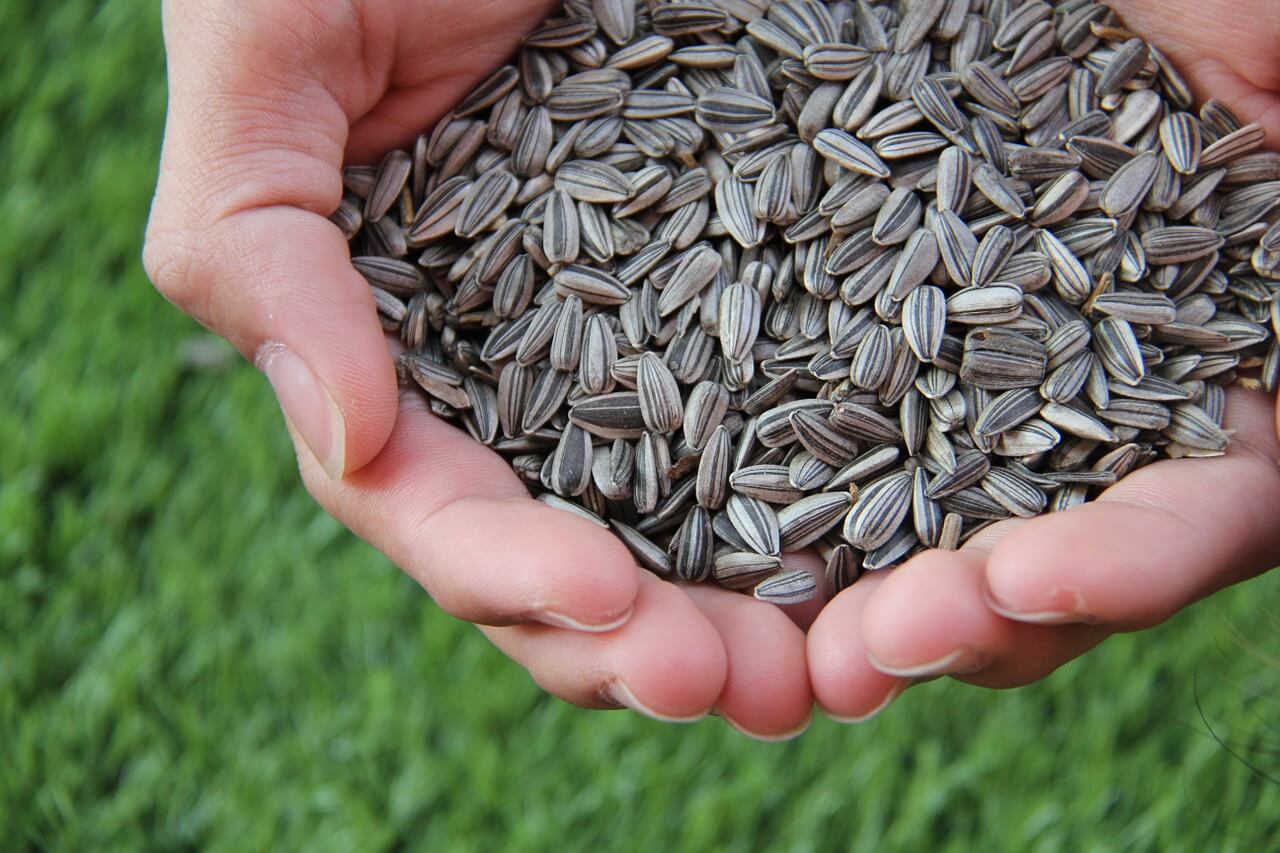The Health Benefits Sunflower Seeds, Nutrients & Harms of Sunflower Seeds


Sunflower, or what is known as a seed, love, or pulp of sunflower, also known as sunflower, or eye of the sun (scientific name: Helianthus Annuus) is an annual plant, which traces its origin to the regions of South America, Which belongs to the Asteraceae family, which is one of the plants grown for its seeds, and the length of its stem can reach between 1 to 3 meters. The outer portion of the disk is from 16 to 30 small yellow-golden flowers, while the inner part of the flower grows into seeds, and these seeds are eaten raw, roasted, cooked, dried, ground, or used to extract sunflower oil from them.
The benefits of sunflower seeds Its content of nutrients


Vitamin E
Sunflower seeds and sunflower oil are among the foods rich in vitamin E and it is one of the fat-soluble vitamins, which is an anti-oxidant, which removes the body from free radicals; As the accumulation of these roots damage the cells of the body, and vitamin E may improve the functions of the immune system .
Calcium
Sunflower seeds contain a good amount of calcium, which enhances the strength and health of the bones, but some types of them may contain a high percentage of added salt, which depletes the levels of calcium in the body. Therefore, unsalted seeds must be chosen to obtain the highest benefit from the calcium content in them .
Selenium
Sunflower seeds are among the foods rich in selenium that are important for reproduction and manufacture of the genetic material known as DNA. It also contributes to reducing oxidative stress caused by free radicals, because it helps the body to build special proteins called anti-enzymes. For oxidative stress, which reduces damage to cells by oxidative stress.
Also Read : 8 Amazing Benefits of Tea Tree Oil
Vitamins B
As each containing 28 grams of sunflower seeds on approximately 20% of the recommended quantities Daily protein of pantothenic acid, which is known as vitamin B 5 , also contain vitamin B 3 or known as niacin, in addition to the presence of vitamin b 6, and vitamin b 9 or folate.
Dietary fiber
The intake of fiber on the body brings many health benefits, as it contributes to maintaining a healthy bowel movement, as it may help to lower cholesterol levels , control blood sugar levels , and promote weight loss.
Healthy fats
contain sunflower seeds on the fat mono -unsaturated, Polyunsaturated Fat, that may be associated with reducing the risk of heart disease , reduce high blood pressure, but even though it is worth Indicating that consumption of fats with a higher caloric content may lead to weight gain and a negative impact on health, and therefore it is advised to moderate their consumption.
The benefits of sunflower seeds according to the strength of scientific evidence


Sunflower seeds possess several health benefits, but the studies that were conducted on them are not strong, and some of its benefits are mentioned which still need more studies to prove them:
Reducing inflammation
A preliminary study published in the American Journal of Epidemiology in 2006 indicated that frequent eating nuts and seeds, such as sunflower seeds, reduces levels of C-reactive protein, and the high amount of this protein in the blood is a sign of inflammation, helps vitamin e found in large quantities in sunflower seeds to reduce protein levels Almtvaal- C, and thus may contribute to eating sunflower seeds in the reduction of infections and diseases caused by them.
Promoting heart health
High blood pressure is one of the main causes of various heart diseases. A small study published in ISRN Nutrition in 2012 indicated that 22 postmenopausal women were added, where sunflower seeds and a type of nuts were added to their systems. A daily diet for a period of three weeks, and the results showed a decrease in the levels of harmful cholesterol, the level of total cholesterol, and triglycerides in these women. These seeds also contain magnesium , potassium, and other compounds useful in reducing blood pressure.
In addition, sunflower seeds are rich in unsaturated fatty acids, especially Linoleic acid, which may help relax blood vessels and lower blood pressure. In a systematic review and statistical analysis of 13 studies published in Circulation in 2014, it was found that Increased linoleic acid levels are associated with a 15% reduction in coronary heart disease, and there has been a 21% decrease in the incidence of death from coronary heart disease.
Also Read : 14 Vitamin D Deficiency Signs: Symptoms, Causes and Treatments
Reducing glucose levels
A preliminary study published in the journal Journal of Pharmaceutical, Biological and Chemical Sciences, indicated that 24 mice with high blood sugar levels, and there was a decrease in blood sugar in the group that consumed sunflower seeds, as well as reduced triglycerides and levels of harmful cholesterol It has, so these seeds can have benefits for people with diabetes, but there is still a need to confirm these results with humans.
Reduce the risk of diabetes
In a preliminary study on mice published in the journal International Journal of Pharmacy and Pharmaceutical Sciences to study the potential effects of the extract of alcohol for sunflower seeds in reducing diabetes and complications resulting from it, shows that extracts of sunflower seeds reduced the level of sugar in the blood of diabetic rats type II, also showed improvement in the levels of fat, weight, but there is still a need for further studies to see this effect.
Benefits of sunflower seeds for pregnant women
A pregnant mother is recommended to introduce nutrient-rich foods to obtain a healthy and balanced diet, to provide the basic nutrients and energy necessary for the growth and development of the fetus, and to help the body to face any changes that may occur, and it is worth noting that sunflower seeds contain many Nutrients that should be added to the diet of a pregnant mother, such as: proteins, monounsaturated fats, zinc, and iron,
Sunflower seeds are also a food source rich in magnesium, an important component for building bones, teeth, tissues, and auxiliary Proteins perform well, and may play a role in reducing the risk of premature birth, It is worth noting that every 28 grams of sunflower seeds cover 8% of the daily needs of iron recommended for daily consumption.
The nutritional value of sunflower seeds


The following table shows the group of nutrients provided by 100 grams of sunflower seeds dried, peeled and unsalted, in addition to the group of nutrients provided by 100 grams of roasted, dried, peeled and unsalted seeds:
| Food article | Roasted, peeled, and unsalted sunflower seeds | Sunflower seeds dried and unsalted peel |
| Calories (kcal) | 619 | 584 |
| Proteins (grams) | 17.21 | 20.78 |
| Fat (grams) | 56.8 | 51.8 |
| Carbohydrates (grams | 20.59 | 20 |
| Fiber (g) | 11.5 | 8.6 |
| Calcium (milligrams) | 57 | 78 |
| Iron (mg) | 6.81 | 5.25 |
| Magnesium (mg) | 129 | 325 |
| Phosphorus (mg) | 1158 | 660 |
| Potassium (milligrams) | 491 | 645 |
| Sodium (milligram) | 3 | 9 |
| Manganese (milligram) | 2.114 | 1.95 |
| Folate (mcg) | 238 | 227 |
| Vitamin C (milligrams) | 1.4 | 1.4 |
Sunflower Seed Safety
The degree of safety of sunflower seeds
Sunflower seeds are healthy foods, but it is worth noting that it is important to consume them in moderation, as they contain Cadmium , Which is one of the trace elements that are available in the soil naturally, but the quantities of this mineral are higher in the soil where sunflower is grown in some areas, as the sunflower plant transports this mineral from the soil to store it in their seeds, so the amounts of cadmium are high in sunflower seeds more than other foods, and may cause high amounts of it damage the kidneys when exposure to them for a long period of time, so should be moderation in eating these seeds.
Caution of using sunflower seeds
Some people suffer from sensitivity to the direction of sun seeds, and although suffering from this sensitivity is rare, there are many cases that have been diagnosed with this sensitivity, and the risk of developing it increases when the person suffers from other types of allergies, specifically allergies. Direction of peanuts, and children are often the most susceptible group for food allergies compared to adults, and the most common symptoms include eczema , itching in the mouth, vomiting, stomach disorders, anaphylaxis or anaphylactic shock. These symptoms range in severity from moderate to severe. To severe.
Does sunflower seeds help to lose weight?


A successful weight loss process involves changing daily eating habits, adopting healthy and balanced diets, as well as increasing physical activity. It is worth noting that not one type of food can reduce weight, but many foods can be introduced to help with the weight loss process, Like sunflower seeds, as they contain fibers that facilitate bowel movement, as well as their contribution to lowering cholesterol levels, controlling blood sugar , and increasing feelings of satiety.
A 2009 review published in Nutrition Reviews indicated that people who eat more fiber tend to have better weights and are more likely to be obese, have heart disease, strokes, diabetes, high blood pressure, and some types of cancer less.
On the other hand, the sunflower seeds is one of the high content fat foods, and are formed mostly of polyunsaturated fat, known health benefits with regard to its role in reducing bad cholesterol ratios, and reduce blood pressure, and blood sugar levels, reduce the risk of stroke, And heart attacks, and that when consumed only within the permitted quantities, and consumed instead of saturated and unhealthy fats, since the fat in general is high in calories, and it should not be consumed in quantities that exceed the body’s needs, so that it does not lead in the end to gain more weight instead of losing it.
Roasted sunflower seeds
Although sunflower seeds can be eaten raw, the roasting process aims to enhance their flavor, by reducing moisture in them which contributes to increasing their crunchy texture, and roasting also changes the color of the seeds, and when comparing roasted and unroasted seeds we do not find Significant difference in the content of fats, carbohydrates, and proteins, but roasted seeds may have a slightly higher fat and calorie content , but as for vitamins and antioxidants, roasted seeds may lose part of these substances, depending on the temperature used and the length of time For roasting, it is also worth noting that the amount of sodium contained in the roasted seeds is higher, it should be paid attention when consumed by people who follow the diet determined by the proportion of sodium .
Sunflower oil
Sunflower oil is extracted from sunflower seeds through a process called cold-press extraction, and it can also be extracted in other ways as well, and this oil is characterized by its high content of unsaturated fats, as it is considered rich With vitamin E, which provides many health benefits to the body. Despite the multiple benefits of this oil, it should be taken in moderation, and not to be used in excess, and some people may warn against using it in large quantities, such as pregnant women, breastfeeding women, diabetics, and people with allergies.










